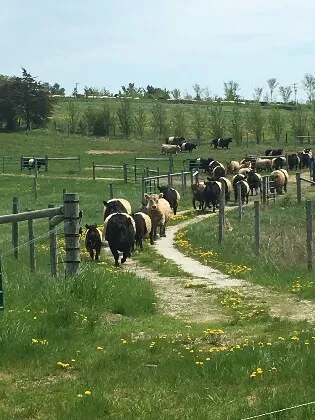As Vermont greens up and the 2019 growing season gets underway, we've put together just a few of the things that Center staff are advising that farmers and growers consider to help get the season off to the right start.
However you're farming or managing farmland, we hope these might be of use to you, that you'll share them with any who might find them useful, and that you'll keep in mind that we're here for you as the season gets going.
"For everyone whose passion is sustainable agriculture, but suffers from the ups and downs of bodily aches and pains from too many hours in the field, unpredictable weather, roller coaster prices for product or whatever else you might be going through on the farm – just remember that the root of the word “passion” is the Latin “passio,” which means “suffering, enduring.” Stay passionate about sustainable food and farming. Persevere. Endure!" - from Beginning Farmer, Land Access & New American Farmer Program Coordinator Ben Waterman
"Spring, and in particular this very wet spring, is a good time to check outlets on any drainage swales, ditches, culverts, or pipes. Debris often accumulates over the winter and can clog up these outlets, leading to ponded water, saturated fields, and potential erosion. It’s also not a bad time to put a rodent guard on drainage pipe outlets if you don’t have them. Furry critters can cause a lot of damage and headaches if they choose to use one of your pipes as their burrow!" - from Farming & Climate Change Program Coordinator Joshua Faulkner
"For farmers and landowners that are spraying their own pesticides, make sure to calibrate your sprayers. Sprayer nozzles can be clogged or damaged by sand or other particles, impacting your product application and efficiency for pest control. Damaged nozzles can result in over or under application of sprays. Save money and your crop by inspecting and calibrating your sprayers early in the season." - from Agronomy Outreach Specialist Laura Johnson
"1) Go slow, especially with wet pastures. When they are wet they are easily compromised and quickly compacted. Wetness also makes pastures into friendly habitat for parasites. Keep livestock on highest, driest areas for now, and 2) if you are interested in providing input on the topic of grazing under solar arrays, or grazing invasive plants or any other contract grazing work - please email us your ideas!" - from Grazing Specialist Kimberly Hagen
“In a recent survey of Vermont schools, we learned that as a rule, Vermont schools are doing terrifically at sourcing local food. (One school we heard from told us that nearly two-thirds of the food they serve is grown in Vermont!) As you go out and enjoy Vermont and its delicious food this summer, ask your farmers and suppliers whether they’re selling to local schools. And if you’d like to know more about how Vermont is engaging in farm-to-school work, check out the 2018 case studies at https://vermontfarmtoschool.org/2018-vermont-farm-school-case-studies. - - from Center Director Linda Berlin
- our website, with lots of information about what we're doing and what we've learned.
- the Sustainable Agriculture Regional Events Calendar, with information about our workshops, pasture walks and other gatherings, as well as opportunities from around the region.
- our Research and Projects page that has lots of information about what we're working on across all our topic areas.
And if we can ever help you find what you need on your own farm, get in touch. If we're not the right folks, we're glad to help you find them!
